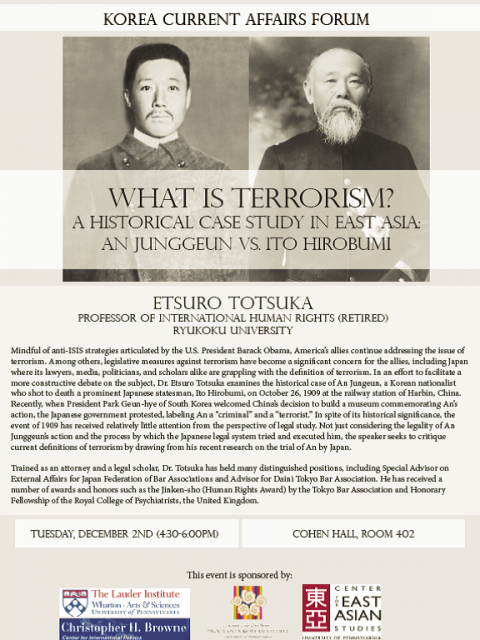
Claudia Cohen Hall, Room 402
Etsuro Totsuka, Professor of International Human Rights (Retired), Ryukoku University
Mindful of anti-ISIS strategies articulated by the U.S. President Barack Obama, America’s allies continue addressing the issue of terrorism. Among others, legislative measures against terrorism have become a significant concern for the allies, including Japan where its lawyers, media, politicians, and scholars alike are grappling with the definition of terrorism. In an effort to facilitate a more constructive debate on the subject, Dr. Etsuro Totsuka examines the historical case of An Jungeun, a Korean nationalist who shot to death a prominent Japanese statesman, Ito Hirobumi, on October 26, 1909 at the railway station of Harbin, China. Recently, when President Park Geun-hye of South Korea welcomed China’s decision to build a museum commemorating An’s action, the Japanese government protested, labeling An a “criminal” and a “terrorist.” In spite of its historical significance, the event of 1909 has received relatively little attention from the perspective of legal study. Not just considering the legality of An Junggeun’s action and the process by which the Japanese legal system tried and executed him, the speaker seeks to critique current definitions of terrorism by drawing from his recent research on the trial of An by Japan.
Trained as an attorney and a legal scholar, Dr. Totsuka has held many distinguished positions, including Special Advisor on External Affairs for Japan Federation of Bar Associations and Advisor for Daini Tokyo Bar Association. He has received a number of awards and honors such as the Jinken-sho (Human Rights Award) by the Tokyo Bar Association and Honorary Fellowship of the Royal College of Psychiatrists, the United Kingdom.
 James Joo-Jin Kim Center for Korean Studies
James Joo-Jin Kim Center for Korean Studies